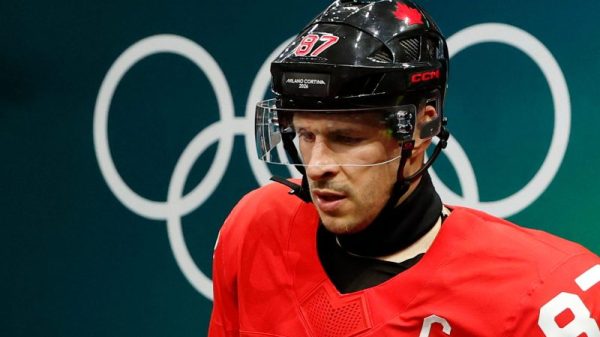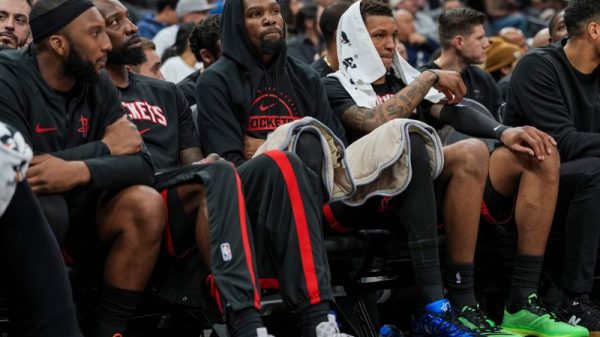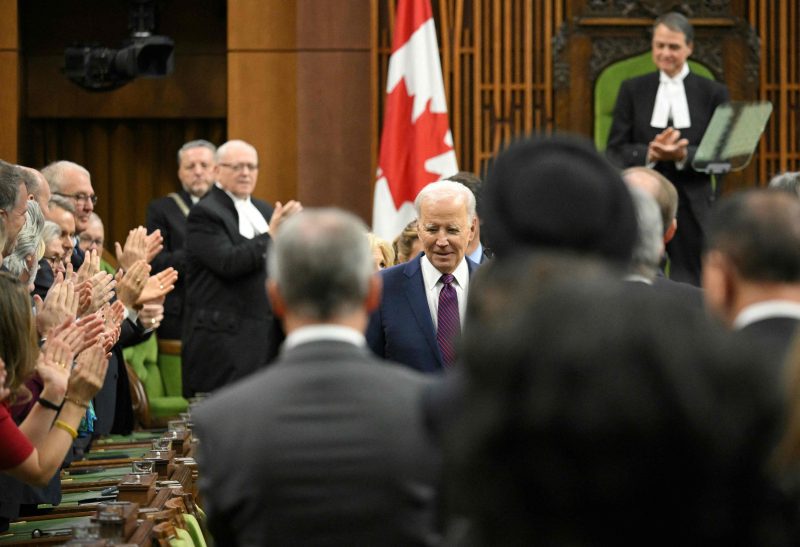OTTAWA — President Biden used his first trip to Canada as president Friday to reaffirm the close ties between the two nations, seeking to solidify a key relationship with America’s northern neighbor at a time when the world appears increasingly divided between democratic and authoritarian blocs.
During a whirlwind 24-hour trip, Biden addressed the Canadian Parliament, receiving several standing ovations, and met one-on-one with Prime Minister Justin Trudeau, who repeatedly referred to him as a personal friend. Trudeau also cited recent “challenging times in our relationship as a country, as two friends and countries,” an apparent reference to the Trump years.
Biden signaled that those times were over. “Today I say to you and to all the people of Canada that you will always, always, be able to count on the United States of America — I guarantee you,” Biden told a boisterous Parliament. “Together, we have built a partnership that is an incredible advantage to both our nations.”
The United States and Canada announced they had reached an agreement to let each of them turn away asylum seekers who seek to cross the border at unofficial entry points. It was a deal long sought by Canadians, who hope to stem the rising number of asylum seekers coming into their country from Upstate New York. In exchange, Canada agreed to create a pathway for 15,000 refugees to enter their country legally from the United States.
Biden’s remarks to Parliament were leavened with a sort of giddy familiarity, as he remarked on renovations to the hall where he was speaking (“You’ve done a hell of a job!”) and earned boos when he said he could not root for the Toronto Maple Leafs hockey team because it had recently beaten his favored Philadelphia Flyers (“I married a Philly girl. If I didn’t say that, I’d be sleeping alone”).
“Bonjour, Canada!” Biden said to start his remarks in the House of Commons, Parliament’s lower chamber. “I must tell you, I took four years of French in school. First time I attempted to make a speech in French, I was laughed at. So that’s as good as I can get right now.”
Despite the lighter moments, the Biden-Trudeau meeting came at a tense moment in the world, as Biden works to hold together the coalition confronting Russian President Vladimir Putin’s invasion of Ukraine. The United States and Canada also had to coordinate a response to China’s growing aggressiveness, especially after a Chinese spy balloon flew over North America this year.
Underlining the global divisions, the summit between the two Western leaders comes just days after Putin met with Chinese leader Xi Jinping in Moscow. During a news conference with Trudeau, Biden rejected the notion that China and Russia were forming a powerful alliance.
“Look, I don’t take China lightly. I don’t take Russia lightly. But I think we vastly exaggerate,” Biden said, adding, “If anything’s happened, the West has coalesced significantly more. We have united coalitions.”
The two leaders also discussed efforts to fight climate change, stabilize Haiti and curb migration. And they are discussing ways to modernize the North American air detection and defense system known as NORAD.
While it has taken Biden two years into his presidency to visit Canada, his first call to a foreign leader after becoming president was to Trudeau.
Biden and his wife, Jill, arrived Thursday evening. They were greeted by Mary Simon, the governor general of Canada, before joining Trudeau and his wife, Sophie Grégoire Trudeau, for a private dinner at their residence.
The visit has been a major focus of news coverage here, and the streets around Biden’s Ottawa hotel displayed numerous American and Canadian flags. A pastry shop, which still boasts of the time President Barack Obama made a brief stop there for a cookie in 2009, sold cookies marked “U.S. Presidential Visit Ottawa 2023.”
Biden’s visit provided a welcome change of subject for Trudeau, who for weeks has faced questions on what his government knew about alleged Chinese interference in recent Canadian elections and how it responded to the meddling.
The president’s trip, which was shorter than Canadian officials had hoped, marked his first official visit to Ottawa since late 2016, when he was the outgoing vice president. At a state dinner that year in Biden’s honor, he gave a toast noting that his first wife’s family was from Toronto and said his sons grew up wanting to be Mounties.
It was a month after Trump’s election, and Biden told Trudeau that the world would be looking to him to champion the “liberal international order” as it faced more challenges than at any time since the end of World War II.
“The way I look at our relationship … I know sometimes we’re like the big brother that’s a pain in the neck and overbearing,” Biden said at the time. “I get it. But we’re more like family, even, than allies.”
President Donald Trump lobbed personal attacks at Trudeau and levied tariffs on Canadian steel and aluminum, enraging Canadians and prompting retaliation. Most Canadian officials breathed a sigh of relief when Biden was elected in 2020, and officials said they were eager to collaborate with his administration to tackle issues such as climate change.
Yet irritants remain between the two countries, including U.S. trade policies that Canadians view as protectionist.
Biden’s “Buy American” rhetoric has worried Canadian business leaders, who are also concerned about the tax credits and other incentives for U.S. manufacturers in Biden’s Inflation Reduction Act, including for clean energy.
In a fall economic update, the Canadian government announced two clean-energy tax credits in response to the Inflation Reduction Act, warning that without new measures to “keep pace” with the U.S. legislation, “Canada risks being left behind.”
In addition, the United States has been pressing Canada to assume a leadership role in Haiti, including by leading a multinational armed force tasked with restoring order to the Caribbean nation, which is reeling from gang violence, hunger and a cholera outbreak.
Canadian officials have given little indication that they are eager to lead such a mission, however, given that Haiti has a long history of destabilizing foreign interventions and that Haitians are divided over the idea of such a deployment. Canada’s top soldier has expressed doubts about whether its military even has the capacity for the task.
Instead, Canada has provided aid, including armored vehicles, to the Haitian National Police and imposed sanctions on Haitian gang leaders and their backers. The United States has imposed sanctions on far fewer Haitians, a fact that is not lost on Ottawa. Trudeau said last week that other countries, including the United States, need to do “much more” to penalize those responsible for the chaos in Haiti.
On Friday, Biden said that any decision about using military force must be made in consultation with the United Nations and the Haitian government. “That is not off the table, but that is not in play at the moment,” he said.
He conceded there was no easy solution. “This is a very, very difficult circumstance, the idea of how do we deal with what’s going on in Haiti, where gangs have essentially taken the place of the government,” Biden said. “In effect, they rule the roost, as the saying goes.”
The new immigration deal, however, ensured that Biden and Trudeau had a high-profile agreement to announce during their summit. Under the existing arrangement, which took effect in 2004, asylum seekers who enter Canada at official border crossings are sent back to the United States, and vice versa.
But the agreement did not apply to unofficial crossings along the 5,500-mile border. Now it will.
Nearly 40,000 asylum seekers crossed into Canada from the United States in 2022, the most since Canada began tracking the number in 2017. Trudeau, who has faced pressure from Quebec’s premier and the opposition Conservative Party to close the “loophole” in the agreement, told reporters this week that his government has “been working very closely with the Americans for many months.”
But if the Safe Third Country Agreement has drawn the ire of conservatives for being too lax and containing loopholes, it has prompted countervailing criticism from liberals for being too harsh — and that criticism is only likely to grow now that its terms have been toughened.
“After midnight tonight, police and border officers will enforce the agreement and return irregular border crossers to the closest port of entry with the United States,” Trudeau said.
Advocacy groups argued before Canada’s Supreme Court in October that the deal violated the right to “life, liberty and security of the person” under Canada’s constitution, because it subjected asylum seekers to possible detention and removal in the U.S. if they were turned away at the Canadian border.
The changes to the agreement mean it will also apply to anyone who crosses into either country at an unofficial entry point and makes “an asylum or other protection claim relating to a fear of persecution or torture” within 14 days. Advocates said the new deal will simply push migrants to pursue more dangerous crossings through dark and marshy woods and fields along the border to avoid detection by authorities.
Maureen Silcoff, a Toronto-based immigration and refugee lawyer, called the new deal “a humanitarian crisis in the making.”
“It’s a lose-lose situation,” she said. “The people crossing are going to be in danger. The government of Canada will lose track of who has arrived. And it’s just unworkable … because you just can’t kind of patrol or monitor the entire border.”
Biden was slated to attend a gala dinner at the Canada Aviation and Space Museum on Friday evening, where the entertainment was to include Inuit throat singers and an Algonquin drum group from Quebec.
Among the guests were expected to be Canadians Michael Kovrig and Michael Spavor, who were detained in China in 2018 in what was widely viewed as retaliation for Canada’s arrest of Huawei executive Meng Wanzhou at the behest of U.S. authorities seeking her extradition on bank and wire fraud charges.
The detention of the “two Michaels,” as they are known here, plunged ties between Ottawa and Beijing into a deep freeze. They were released in 2021, hours after the Huawei executive reached a deal with the U.S. Justice Department that allowed her to return to China in exchange for acknowledging some wrongdoing in the criminal case.



























